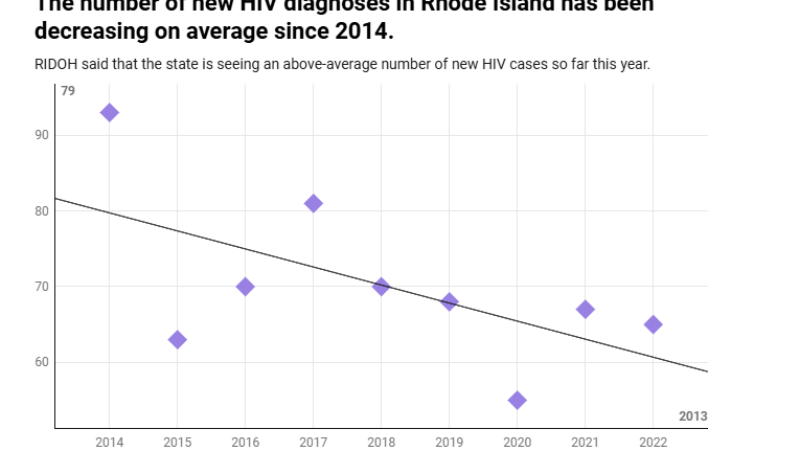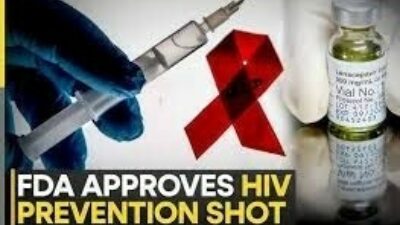
Courtesy of The Brown Daily Herald. Written by Amelie Chin
Rhode Island is seeing an above-average number of new HIV diagnoses this year, public health officials announced in an Oct. 17 community partner advisory.
The exact number of new HIV cases in 2024 has not been released. The Rhode Island Department of Public Health typically only releases finalized data, according to Public Information Officer Joseph Wendelken.
The number of new diagnoses has decreased year-over-year, with the exception of 2021, which saw an increase from the decade-low in 2020 that is associated with quarantine measures during the COVID-19 pandemic.
The exact cause behind the increased number of HIV cases has not yet been determined, Wendelken explained. Counts of new HIV diagnoses can indicate recent transmission or a past infection that may have occurred years ago but has only been recently detected, since many people with HIV often do not experience symptoms or other signs of the disease.
The increased numbers can also capture infections that may have originally occurred outside of Rhode Island or the country.
HIV often affects some populations more than others, according to RIDOH. These communities include Hispanic and Latino men in their 20s who have sexual intercourse with other men, and Rhode Island residents who were born outside the U.S.
“Structural inequities, social determinants of health and barriers to health equity are ongoing challenges in Rhode Island that continue to drive health disparities,” Wendelken wrote in an email to The Herald.
“It is important to avoid stigmatizing a particular group, but rather support those at highest risk and ensure that all communities remain vigilant,” he added.
RIDOH has also promoted testing and treatment options for HIV and STI prevention via social media and dating app campaigns, Wendelken said. The campaign now also targets newly identified at-risk communities, expanding outreach to LGBTQ+ nightlife spaces, ethnic markets and other community gathering spaces.
HIV is primarily transmitted by bodily fluids such as blood, semen, breast milk and vaginal fluids, said Jackie Goldman, a program director at Brown’s department of epidemiology. Most HIV infections arise from unprotected sex or through the sharing of syringes during intravenous drug use.
Medical advancements have dramatically decreased the likelihood of severe complications for those diagnosed with HIV, Goldman explained.
Still, “younger men and especially gay and bisexual men who are sexually active should be routinely screened for HIV and should consider PrEP for HIV prevention,” Wendelken said.
PrEP, or pre-exposure prophylaxis, is a medicine for people at risk of HIV infection that has proven to be effective at preventing transmission.
He pointed to the abundance of clinics in the state where people can access HIV testing and PrEP, as well as “safety-net” programs for uninsured or underinsured people.
Students at Brown can access HIV testing and PrEP through Brown Health Services on campus.
Goldman also highlighted potential reasons for the disproportionate increase in new HIV cases among bisexual and gay communities. According to Goldman, anonymous sex and underuse of sexual health resources in those communities is more common due to “shame and stigma surrounding being gay.”
AIDS Care Ocean State (ACOS) works in Rhode Island to prevent HIV transmission and support people living with HIV. According to Stephen Hogan Jr., director of development and public relations at ACOS, the organization provides subsidized housing for over 90% of HIV-positive people in Rhode Island.
Hogan Jr. explained that unhoused individuals experience higher incidence rates of HIV. Those at risk of HIV “are able to be a little bit more on the secure side, to be able to reach out for assistance programs and case management,” he said.
ACOS also spearheads a harm-reduction vending machine program, making condoms, safe sex kits, wound kits, hygiene products and Narcan available in various locations around the state, Hogan added. Rhode Island is [only] the third U.S. state or territory to provide these vending machines.
“There is this complacency when it comes to HIV and AIDS in our state, even across the country,” Hogan said. “There’s a lot of folks, especially within the newer generations, who have not seen the death and destruction of the ’80s and the early ’90s. There’s all this lost information, but (also) the loss of empathy.”



